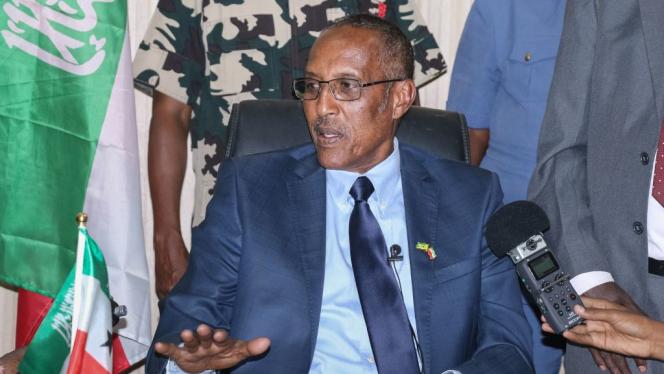Thursday 21 November 2024
The problem with Bihi’s paternalism

Amid the height of campaigns for the presidential and political association elections in Somaliland, the incumbent president and candidate for the ruling party, Muse Bihi Abdi, recently gave an interview to the BBC Somali service. The interview was intriguing, both for its timing and because the president has rarely granted interviews over his seven years in office. Contrary to expectations, his responses left a great deal of ambiguity, political uncertainty, and more questions than answers.
In the interview, Bihi avoided several key questions regarding his leadership, his government’s performance, and his current electoral campaign. For example, when asked a pressing question, about the frozen situation in Somaliland’s eastern regions, Bihi refrained from giving a strong outline of his view. Instead, he hinted that he would reveal his plans if re-elected, implying that voters should support him based on unspecified intentions.
When asked how he differs from his opposition rivals—a question typically used by candidates to promote their political strengths and showcase their programmes and plans—Bihi dismissed the inquiry, claiming that the difference lay in their “stature and ideas” and directed the interviewer to consult his party’s manifesto for specifics. Frustrated by his evasive responses, the interviewer pressed for at least one or two key distinctions, but Bihi refused to elaborate, displaying a disregard for both the interviewer and his potential voters. In response to another crucial question about his government’s recent geopolitical agreements and how the people of Somaliland have responded, he told the interviewer: “you are an investigative journalist, you can find out”. After the journalist pressed him again he said: “check YouTube.”
This interview highlighted a stark contrast to the tone the president used during his presidential campaign seven years ago. It reminded me of a notorious interview with the Eritrean President, Isaias Afwerki, in which he gave a famously dismissive response to questions about elections in Eritrea. When asked, Isaias responded: “What elections?”
As the interviewer attempted to clarify with a question about hypothetical elections in Eritrea, Isaias replied that he would see what elections brought about in America before considering them in Eritrea—perhaps after three to four decades, “or maybe more, who knows?” he added. Sixteen years on from that infamous interview, Isaias remains in power, keeping the Eritrean people entirely marginalised in matters of politics, power, and public administration.
I am not suggesting a similarity in governance here, as Mr Bihi came to power through a popular vote and, although he has stayed two years beyond his mandate, political life and democratic processes have not been completely suppressed. Eritrea is a militarised dictatorship. However, his approach and language during the interview conveyed an authoritarian mindset. He addressed the public in a paternalistic manner, with a tone of entitlement that discouraged questioning or doubt. In his view, the public does not need to be convinced by clear visions or policies; instead, they are to be “served” by those who, presumably, know their best interests. The toll of seven challenging years in power was evident; he appeared physically exhausted, emotionally disengaged, and uninterested in public opinion. Meanwhile, he is running for re-election in an open and democratic process.
Disregarding public opinion is not a new tactic in Bihi’s political toolkit; rather, it has been a defining feature of his government. Since his election seven years ago, he has assembled a government largely composed of ineffective technocrats, appointing relatives and personal acquaintances to key positions. His administration has remained disconnected from the public, often dismissing major concerns and questions as mere “mob agitation” orchestrated by politicians, clan figures, and businessmen vying for public resources. Guided by this mindset, his government has overlooked significant public issues and genuine frustrations within specific constituencies. This disregard has contributed to notable unrest, particularly in Somaliland’s eastern regions, where frustrations have erupted into armed conflict, leading to large areas falling outside government control. In other areas, his government narrowly averted political escalations that threatened to undermine civil peace and stability during his term.
Disregarding public opinion is not a new tactic in Bihi’s political toolkit; rather, it has been a defining feature of his government.
Power often corrupts leaders, and Bihi is no exception. In reality, he has even more reason to fall into corruption and self-aggrandisement. In his view, and that of his supporters, he is a veteran SNM fighter and a living martyr for his country, convinced that he alone knows what is best for the populace. This is a common trait among African statesmen, whose authoritarianism doesn’t operate according to a populist logic in which the people know best, and the leader positions himself as the embodiment of their collective will. Rather than consulting public opinion, leaders like Bihi claim that they know what is best for their people, legitimising their claims on the basis of their roles in past liberation struggles. Daniel Paget, an academic at the University of Sussex, describes this as “elitist plebeianism”. In cases like this, Paget continues, the leader doesn’t have to defer to “people’s possibly wayward judgements”, because it is his duty to govern on behalf of the people, “over the people’s wishes, if necessary… It is a vision of guardianship.”
This “saviour” mentality is dangerous in politics, as it undermines democratic values and institutions. When leaders act under the assumption that they are saviours, the risks to democratic governance intensify. However, periodic elections are a crucial safeguard against the entrenchment of autocratic behaviour and a sense of entitlement to rule. The upcoming elections present Somalilanders with an opportunity to reject the anti-democratic stance currently threatening the principles of democratic governance and popular rule.
In a somewhat encouraging statement during the interview, President Bihi suggested that if he is defeated in the elections, he would simply retire. These remarks were reassuring to supporters of democratic rule, and many of them, after watching his lacklustre interview, may now find themselves eager to encourage voters to send him into retirement. This is not to say that opposition leaders necessarily offer better prospects or present innovative ideas and programmes for development. Rather, the periodic transition of power itself prevents the entrenchment of the “what elections?” mindset seen in long-standing leaders. Additionally, there are numerous other issues related to Bihi’s policies, performance, and behaviour that could justify removing him from power in these elections.








